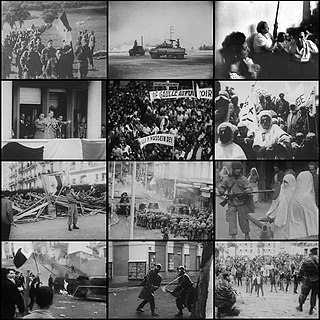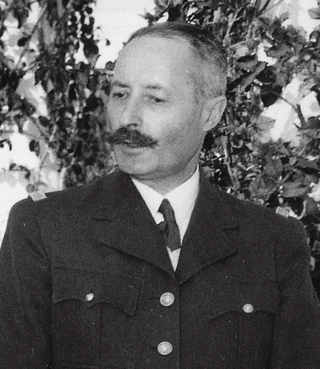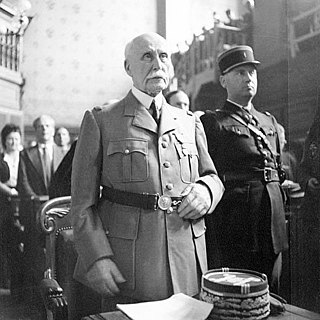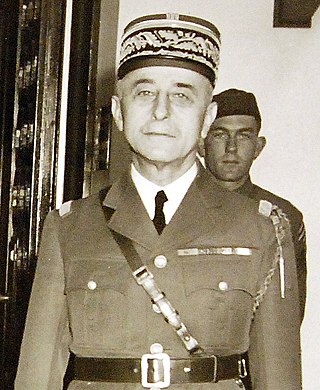
Operation Torch was an Allied invasion of French North Africa during the Second World War. Torch was a compromise operation that met the British objective of securing victory in North Africa while allowing American armed forces the opportunity to begin their fight against Nazi Germany and Fascist Italy on a limited scale. It was the first mass involvement of US troops in the European–North African Theatre and saw the first large-scale airborne assault carried out by the United States.

The Algerian War was a major armed conflict between France and the Algerian National Liberation Front (FLN) from 1954 to 1962, which led to Algeria winning its independence from France. An important decolonization war, it was a complex conflict characterized by guerrilla warfare and war crimes. The conflict also became a civil war between the different communities and within the communities. The war took place mainly on the territory of Algeria, with repercussions in metropolitan France.

Free France was a political entity that claimed to be the legitimate government of France following the dissolution of the Third Republic. Led by General Charles de Gaulle, Free France was established as a government-in-exile in London in June 1940 after the Fall of France during World War II and fought the Axis as an Allied nation with its Free French Forces. Free France also supported the resistance in Nazi-occupied France, known as the French Forces of the Interior, as well as gained strategic footholds in several French colonies in Africa.

Henri Honoré Giraud was a French military officer who was a leader of the Free French Forces during the Second World War until he was forced to retire in 1944.

French Algeria, also known as Colonial Algeria, was the period of Algerian history when the country was a colony and later an integral part of France.

Algerian nationalism is pride in the Algerian identity and culture. It has been historically influenced by the conflicts between the Deylik of Algiers and European countries, the French conquest of Algeria and the subsequent French colonial rule in Algeria, the Algerian War, and since independence by Arab socialism, Islamism and Arab nationalism.

The history of Jews in Algeria goes back to Antiquity, although it is not possible to trace with any certainty the time and circumstances of the arrival of the first Jews in what is now Algeria. In any case, several waves of immigration helped to increase the population. There may have been Jews in Carthage and present-day Algeria before the Roman conquest, but the development of Jewish communities is linked to the Roman presence. Jewish revolts in Israel and Cyrenaica in the 1st and 2nd centuries certainly led to the arrival of Jewish immigrants from these regions. Jewish proselytizing among the Berbers is an established historical fact, but its importance remains debated.

The Sétif and Guelma massacre was a series of attacks by French colonial authorities and pied-noir European settler militias on Algerian civilians in 1945 around the market town of Sétif, west of Constantine, in French Algeria. In response to French police firing on demonstrators at a protest on 8 May 1945, riots in the town were followed by attacks on French settlers (colons) in the surrounding countryside, resulting in 102 deaths. The French colonial authorities and European settlers retaliated by killing between 6,000 and 30,000 Muslims in the region. Both the outbreak and the indiscriminate nature of its retaliation marked a turning point in Franco-Algerian relations, leading to the Algerian War of 1954–1962.
Jews outside Europe under Axis occupation suffered greatly during the Holocaust and World War II.
Henri d'Astier de La Vigerie was a French soldier, Résistance member, and conservative politician.

José Aboulker was a French Algerian Jew and the leader of the anti-Nazi resistance in French Algeria in World War II. He received the U.S. Medal of Freedom, the Croix de Guerre, and was made a Companion of the Liberation and a Commander of the Légion d'honneur. After the war, he became a neurosurgeon and a political figure in France, who advocated for the political rights of Algerian Muslims.

The épuration légale was the wave of official trials that followed the Liberation of France and the fall of the Vichy regime. The trials were largely conducted from 1944 to 1949, with subsequent legal action continuing for decades afterward.
The French State, popularly known as Vichy France, as led by Marshal Philippe Pétain after the Fall of France in 1940 before Nazi Germany, was quickly recognized by the Allies, as well as by the Soviet Union, until 30 June 1941 and Operation Barbarossa. However, France broke with the United Kingdom after the destruction of the French Fleet at Mers-el-Kebir. Canada maintained diplomatic relations until the occupation of Southern France by Germany and Italy in November 1942.

The French Committee of National Liberation was a provisional government of Free France formed by the French generals Henri Giraud and Charles de Gaulle to provide united leadership, organize and coordinate the campaign to liberate France from Nazi Germany during World War II. The committee was formed on 3 June 1943 and after a period of joint leadership, on 9 November it came under the chairmanship of de Gaulle. The committee directly challenged the legitimacy of the Vichy regime and unified all the French forces that fought against the Nazis and collaborators. The committee functioned as a provisional government for Algeria and the liberated parts of the colonial empire. Later it evolved into the Provisional Government of the French Republic, under the premiership of Charles de Gaulle.

Vichy France, officially the French State, was the French rump state headed by Marshal Philippe Pétain during World War II. It was named after its seat of government, the city of Vichy. Officially independent, but with half of its territory occupied under the harsh terms of the 1940 armistice with Nazi Germany, it adopted a policy of collaboration. Though Paris was nominally its capital, the government established itself in the resort town of Vichy in the unoccupied "free zone", where it remained responsible for the civil administration of France as well as its colonies. The occupation of France by Nazi Germany at first affected only the northern and western portions of the country, but in November 1942 the Germans and Italians occupied the remainder of Metropolitan France, ending any pretence of independence by the Vichy government.

The Géo Gras Group was a French resistance movement that played a decisive role during Operation Torch, the British-American invasion of French North Africa during World War II.

Charles Noguès was a French general. He graduated from the École Polytechnique, and he was awarded the Grand Croix of the Legion of Honour in 1939.

The liberation of France in the Second World War was accomplished through diplomacy, politics and the combined military efforts of the Allied Powers, Free French forces in London and Africa, as well as the French Resistance.
On February 10, 1943, Ferhat Abbas published the Manifesto of the Algerian People, which called for a new status for the “Algerian Nation” and was signed by 28 elected Muslim officials.
The French Civil and Military High Command was an administrative and military governing body in Algiers that was created in connection with the Allied landings in French North Africa on 7 and 8 November 1942 as part of Operation Torch. It came about as a result of negotiations between the Americans and two military figures from Vichy France whom the Americans believed could assure safe passage for the landing forces, namely Henri Giraud and François Darlan.














